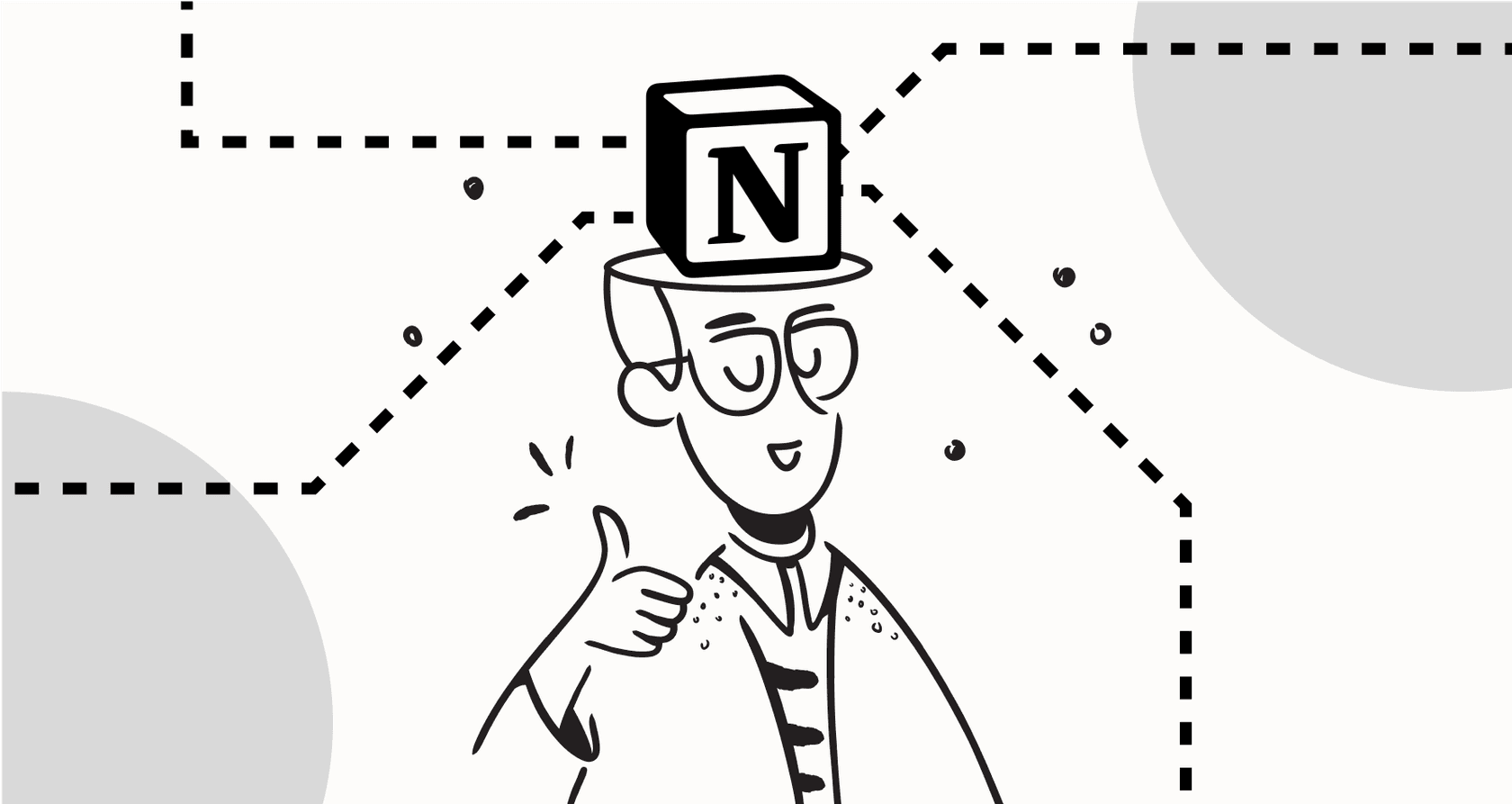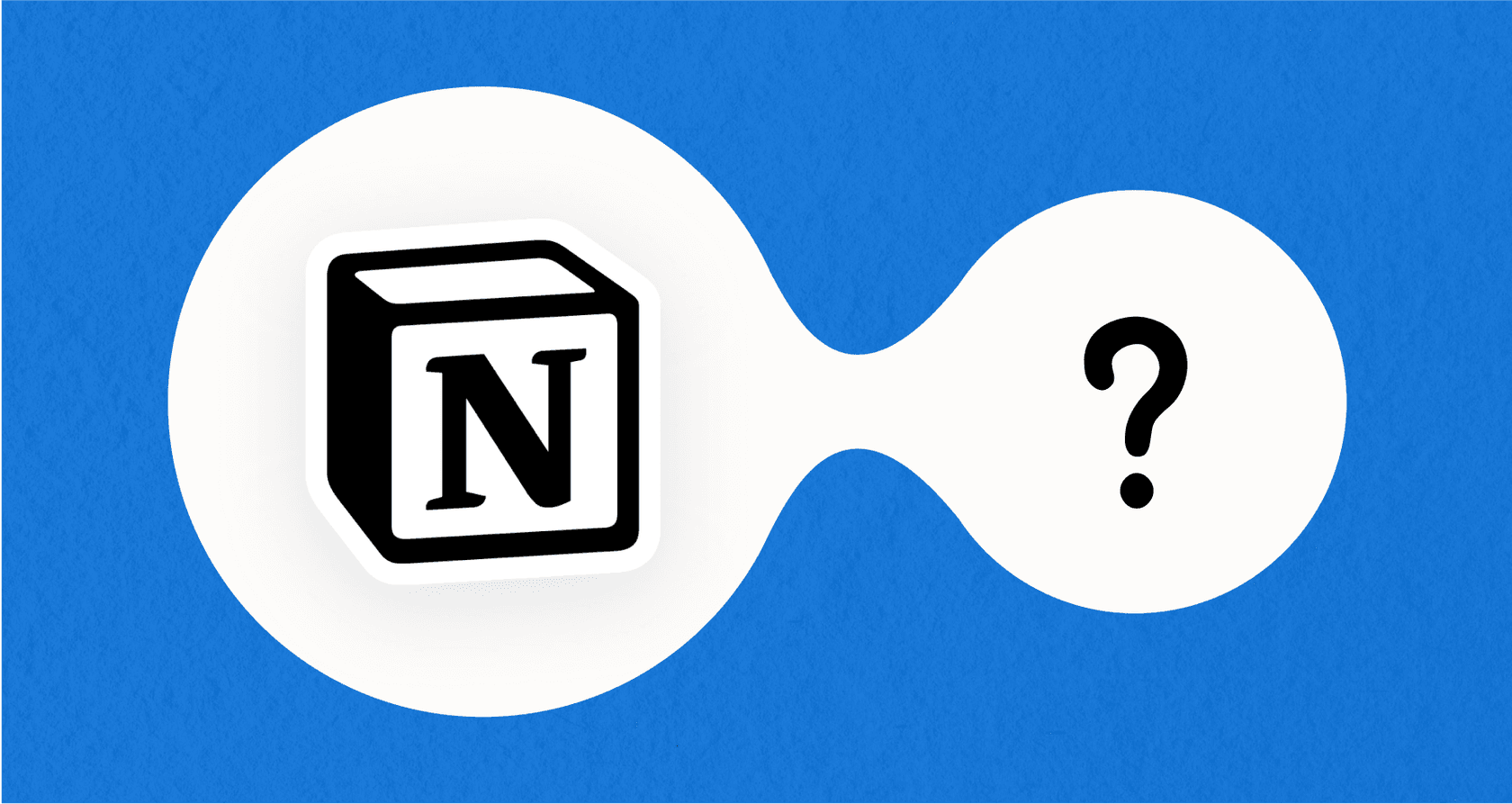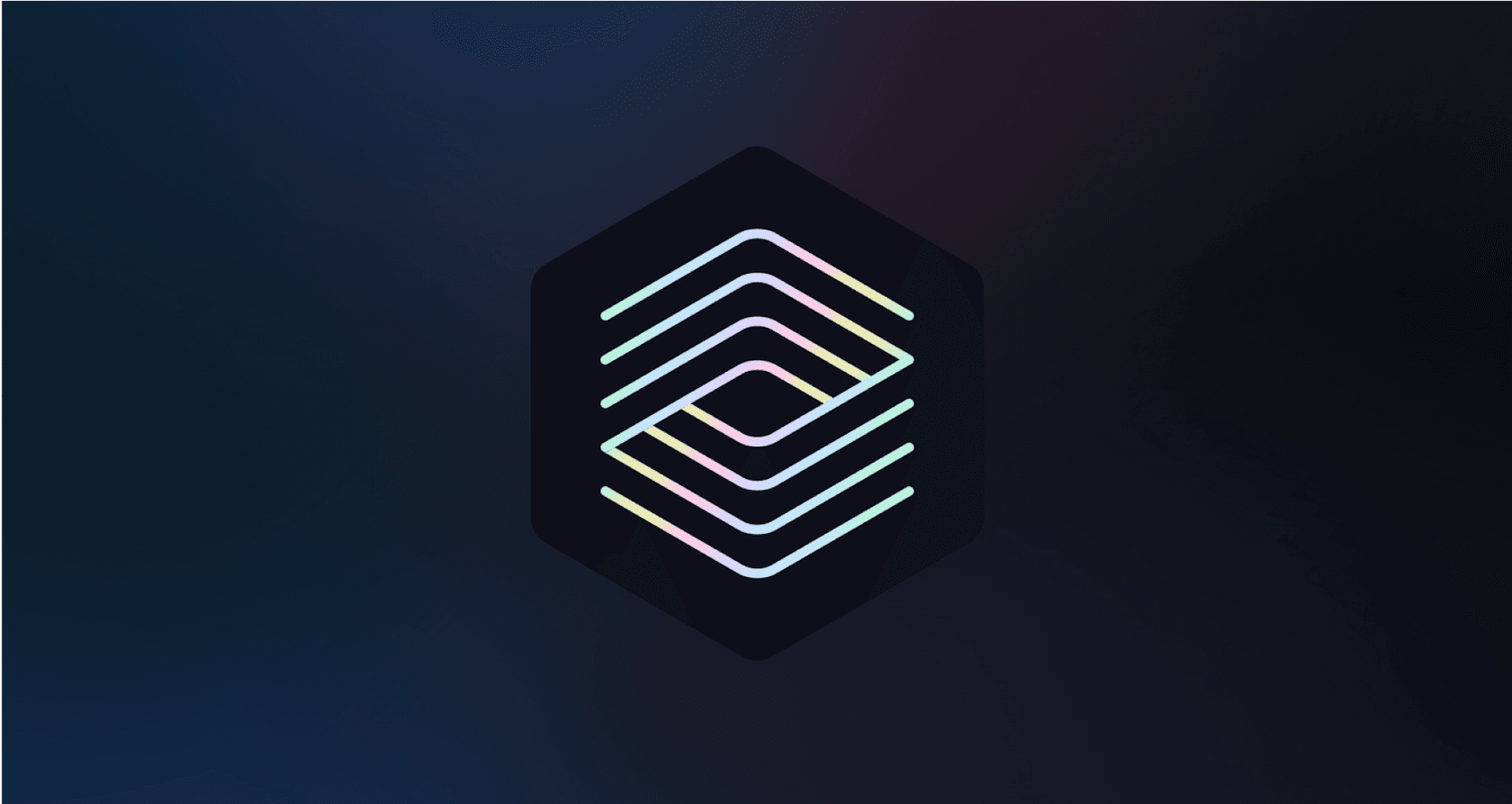
Let’s be honest, your team’s knowledge is probably all over the place. Project updates are in Jira, big decisions get lost in Slack DMs, and the final reports are somewhere in a Google Drive folder you can never find. Just locating one piece of info can feel like a full-on digital scavenger hunt.
This is the exact problem Notion AI Connectors are meant to solve. The idea is to create a central hub where AI can search across all your apps at once. Sounds amazing, right?
Well, it’s a powerful concept, but the reality can be a bit messy. The setup isn’t as simple as you’d hope, and some of the requirements can stop you dead in your tracks. This guide will walk you through the whole Notion AI Connectors setup, pointing out the specific rules, frustrating limits, and a much easier alternative for bringing all your knowledge together.
What are Notion AI Connectors?
Think of Notion AI Connectors as bridges that let Notion’s AI peek into your other apps to find information. The goal is to give you a single search bar for your entire digital life. Instead of flipping between ten different tabs, you can just ask a question in Notion and get an answer pulled from all your connected tools.
Right now, Notion has connectors for some of the usual suspects in the workplace:
-
Slack
-
Google Drive
-
Jira
-
Microsoft Teams & SharePoint
-
GitHub
-
Linear
The pitch is pretty clear: spend less time digging and more time getting things done. It could help you get a project update without having to schedule another meeting, or help a new hire find the onboarding docs without bugging their manager for the tenth time. It’s supposed to turn Notion into your company’s brain, but how well it works really depends on whether you can get through the setup and understand its limits.
The setup process and requirements
Getting your connectors working involves a few steps, but the path is full of little roadblocks that can be a real pain.
A quick look at the setup steps
-
Finding the connectors menu: First things first, you have to know where to look. In Notion, head over to "Settings" → "Notion AI". You'll see a list of the apps you can connect.
-
Giving permission: Once you pick an app, you’ll get sent to that platform (like Google or Slack) to sign in and give Notion permission to access your stuff. This is a pretty standard process, but here’s the kicker: you often need to be an admin in both Notion and the app you’re trying to connect.
-
The waiting game: After you’ve given permission, Notion starts indexing your data. This isn’t instant. Settle in and be prepared to wait, because the first sync can take up to 72 hours, depending on how much info it needs to go through.

Requirements you can’t get around
This is where a lot of people hit a wall. Notion has some specific, non-negotiable rules that lock many teams out of using connectors altogether.
-
You have to be on the right plan: Notion AI Connectors are only available if you’re on the Business or Enterprise plans. If you're a freelancer on the Plus plan or a small team trying to keep costs down, you’re out of luck. This has been a big source of frustration for people who feel like Notion is only catering to big companies.
-
You need to be an admin: You absolutely have to be a workspace owner in Notion and an admin in the other app. This is a huge blocker for most people. The person who wants to connect a tool is rarely the same person who has the admin keys to the entire company's Google Workspace or Slack.
-
Google Workspace gets tricky: The rules for connecting Google Drive are especially tough. You need to be on a paid Google Workspace plan and have more than one person in your Notion workspace.
While Notion makes you wait days for a sync and navigate a maze of admin permissions, tools like eesel AI take a much simpler route. You can get helpdesk and knowledge base integrations going in just a few clicks, so you're live in minutes, not days. The setup is completely self-serve, which means no more hunting down admins or sitting through sales calls just to get started.
Notion AI Connectors: Features, use cases, and limitations
Let's say you managed to jump through all the setup hoops. What can you actually do with Notion AI Connectors? And more importantly, what are the trade-offs?
How people are using the connectors
Once everything is synced up, you can start using your new all-in-one knowledge base for a few key things:
-
One search to rule them all: This is the main attraction. You can ask Notion AI, "What’s the latest on the Albatross project?" and it can pull updates from Jira, find relevant chats in Slack, and grab the final report from Google Drive.
-
Onboarding new hires: New team members can ask questions like, "What's our expense policy?" and get an answer pulled from an HR doc in Google Drive and a summary from a recent Slack announcement.
-
Prepping for meetings: Before a big meeting, you can ask Notion AI to summarize all the recent decisions and action items for that topic, saving you from having to dig through three different apps yourself.

Understanding the limitations
While those use cases sound pretty good, the connectors come with some major limitations that aren't always obvious right away.
-
It has a short memory: The integrations often only pull data from the past year. If you're looking for info from a project that wrapped up 18 months ago, you probably won't find it. They also can't read text inside images or videos, so that content stays hidden.
-
It's still in beta: Many of the most important connectors, like the ones for Slack and Microsoft Teams, are still technically in beta. That can mean they're a bit buggy, unstable, or just don't have all the features you'd expect.
-
It finds things, it doesn't learn: Notion AI Connectors are great for search and retrieval, but that's where it ends. They don't learn from your team’s successful answers or figure out patterns in conversations. It’s a tool for finding knowledge that already exists, not for creating or improving it.
These limitations really show the difference between a general AI tool and one built for a specific job. eesel AI is designed for support and internal knowledge tasks. It doesn't just search your documents; it actually trains on your past support tickets to understand context, brand voice, and what solutions actually work. It can even automatically draft new knowledge base articles from resolved tickets, actively filling the information gaps that Notion only helps you find.
![A view of the eesel AI automated ticketing system dashboard showing one-click integrations with tools like Zendesk and [REDACTED].](/_next/image?url=https%3A%2F%2Fwebsite-cms.eesel.ai%2Fwp-content%2Fuploads%2F2025%2F08%2F03-Screenshot-of-integrations-available-in-the-eesel-AI-automated-ticketing-system.png&w=1680&q=100)
A look at Notion AI's pricing
The cost is probably one of the biggest hurdles. Access to connectors is tied to Notion's pricier plans, which puts it out of reach for a lot of smaller teams and individuals.
| Plan | Monthly Price (per user, billed annually) | AI Connectors Access | Key Features |
|---|---|---|---|
| Free | $0 | No | Collaborative workspace, basic page analytics. |
| Plus | $8 | No | Unlimited blocks for teams, unlimited file uploads. |
| Business | $15 | Yes | SAML SSO, Private teamspaces, Bulk PDF export, Advanced page analytics. |
| Enterprise | Custom | Yes | User provisioning (SCIM), Advanced security & controls, Customer success manager. |
To use connectors, your team has to be on the Business plan, which costs at least $15 per user per month (if you pay annually). For a small team of 10, that's a commitment of $1,800 a year, just to unlock this one feature set. If you're a solo user, it's just not an option.
For comparison, eesel AI's pricing is clear and predictable. All our core products (AI Agent, Copilot, Chatbot) are included, so you don't have features locked away in the most expensive tiers. Our plans are based on usage, not how many seats you have, and we'll never charge you per resolution. This gives you a clear return on your investment without any surprise costs or forced upgrades.
eesel AI Copilot using knowledge sources to help human agents in a help desk.
A great idea with real-world problems
Notion AI Connectors present a really cool vision of a single, unified workspace where all your team's knowledge is just a search away. But in reality, the feature is stuck behind a complicated setup, strict admin and plan requirements, and some pretty big functional limits.
For many teams, especially those in customer support or IT who need a tool built for their specific needs, the barriers are just too high. The functionality isn't tailored enough to solve their main problems, and the cost makes it a non-starter. The right tool shouldn't make you jump through hoops; it should be easy to set up, learn from how you already work, and start helping you right away.
Ready to connect your knowledge without all the complexity? eesel AI is a purpose-built platform that links to your helpdesk, Slack, Confluence, and Google Docs in minutes. You can even simulate its performance on your past tickets to see your potential resolution rate before you even go live.
Frequently asked questions
Notion AI Connectors aim to create a central hub where AI can search across all your integrated apps. It helps teams by offering a single search bar for their entire digital knowledge, reducing time spent searching across different platforms.
To proceed with the Notion AI Connectors setup, you must be on a Notion Business or Enterprise plan and typically need to be an admin in both Notion and the app you're connecting. Specific hurdles exist for Google Workspace connections, requiring a paid plan and multiple users.
After granting permissions, the initial sync for the Notion AI Connectors setup can take up to 72 hours. The exact time depends on the volume of information Notion needs to index from your connected applications.
Yes, the Notion AI Connectors setup has limitations such as often only pulling data from the past year, inability to read text in images/videos, and many connectors still being in beta. It primarily focuses on searching existing knowledge, not learning or improving it.
To use the Notion AI Connectors setup, your team must be on either Notion's Business plan ($15/user/month billed annually) or the Enterprise plan (custom pricing). It is not available on Free, Plus, or personal Google One premium plans.
The Notion AI Connectors setup currently supports integration with apps like Slack, Google Drive, Jira, Microsoft Teams & SharePoint, GitHub, and Linear. This allows Notion's AI to access information from these various platforms.
Teams typically use the Notion AI Connectors setup for a unified search across all apps, streamlining new hire onboarding by easily finding policy documents, and preparing for meetings by summarizing relevant decisions and action items from connected tools.
Share this post

Article by
Kenneth Pangan
Writer and marketer for over ten years, Kenneth Pangan splits his time between history, politics, and art with plenty of interruptions from his dogs demanding attention.







